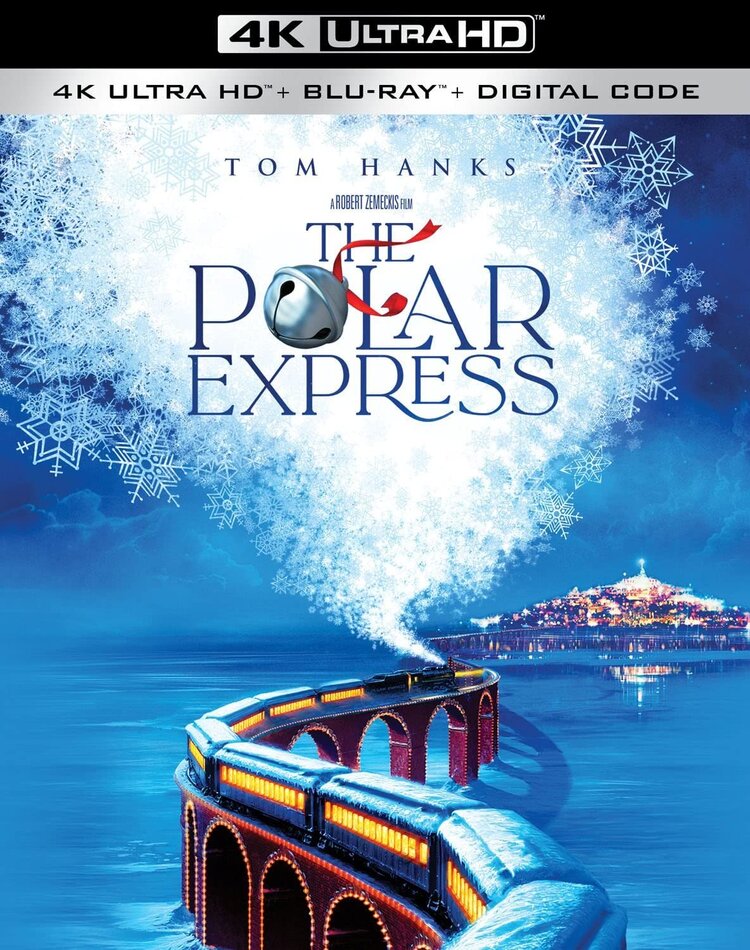
The Polar Express (2004; dir. Robert Zemeckis; rated G) is a weird, dark flick that should be darker.
A motion-capture adaptation of the beloved children’s book (written by Chris Van Allsburg), the movie starts well—then it loses steam. This doesn’t sap my enjoyment. The product is both sinister and cute, though. It’s a curiosity that never quite gels.
Christmas Eve: Hero Boy (adult-voiced by Tom Hanks) is up late. Doubtful of Santa Claus’s existence, he slinks around the house to confirm his suspicion that Mom and Dad (Tom Hanks voices Dad) prop the illusion that the Big Man is a-foot. As Hero Boy drifts off to sleep, an extensive train, the Polar Express, stops outside his house. Hero Boy, the conductor (Tom Hanks) says, has a ticket to ride—and the Polar Express is bound for the North Pole! Will our disbelieving tyke get on board? Will he find proof that Santa and his elves exist? (Dun dun dun dun.)
Zemeckis and co. use motion-capture CGI to create an animated world full of somewhat lifelike characters and settings. This digitalization, infused with live-action performances, is odd. When the movie first opened, I used to hear the FX weren’t that innovative; that, before the film appeared, certain video games had done more visually with far less fanfare. Since then, Polar has become an infamous example of the ‘uncanny valley’ effect. Its characters can appear dead-eyed, even soulless.
And I don’t mind.
The movie gains from this eeriness. At the start of the movie, all is wintry quiet. That nocturnal Christmas hush is the best thing about The Polar Express. What follows the opening minutes crimps it; but that spooky tang, that strange, dreamlike fix of reality and fantasy, never fades. The movie is better for it.
Polar falters under fuzz. We spend too much time on the train getting to know other munchkins. Hero Boy befriends a cute girl, then a lonely boy from the wrong side of the tracks who sings a too-sweet tearjerker of a song. Of course, the moviemakers built Polar for kids. To satiate its target demo, it can’t be that dark. And to give Zemeckis his due, he never lets a case of the cutes overwhelm the story. Subdued or otherwise, darkness frosts the edges. See the scene in which Hero Boy meets the ghost hobo atop the train. Or when our hero and his friends get an inside view of the industrial, work-a-day-like nature of Santa HQ. This is interesting, not exactly heartwarming stuff. Mixing both sweet and bitter tones, the movie (you could say) aims to offset any treacle in its message (lest you turn into a stone-hearted person, never stop believing in the magic, the spirit, of the season—as manifested by Santa and his horde). To a point, the movie walks this line. It captures this balance. But in the end, it’s just too reassuring. The movie cutes up Hero Boy’s good-bad dream about Santa.
Polar bases its appeal off this conflict, this push and pull between doubt and belief. I want a darker, more unhinged story, one where each turn of the plot, each relationship, brushes up against (or meets) a stronger sense of danger, of malice and discontent.* Hero Boy should question more, be less susceptible to awe. Especially if much of what he encounters in the movie is… dark and cracked. At its most contrived (and the entire myth of Santa Claus is just that), the movie undermines a sense of wonder it struggles to create. I appreciate the wild train journey (the hairpin turns have a wackiness worthy of Indiana Jones and the Temple of Doom). I dig the visualization of the North Pole (it has the air of an Eastern European factory town). The elves are off-putting imps. There’s a range of choices Zemeckis and co. make that gives the movie a dark, Roald Dahl-like nuttiness. But Dahl, author of The Twits and Charlie and the Chocolate Factory (among other children’s classics), wasn’t one to furl his freak flag. His stories don’t condescend to kids. They posit the truth that the world can be a very dangerous place, that good things can happen to good people—but as an exception rather than a rule. In short, Dahl understood that sometimes the best fantasies (the best fables) are the most wicked.
Regardless. Let’s applaud Polar for what it does well. The movie is a decent adaptation. As a fun, feel-good entertainment—a holiday perennial rendered with care, that conjures, in part (at least in the beginning), the magic of Christmas—it’s a serviceable way to kill time. Sure, I’m a weirdo who craves a meaner, more adult version of the story. But even if I kick the movie too hard for its cuteness, I’m convinced there’s a better, more ambiguous version that cooks beneath the surface.
The Polar Express is a missed opportunity, and it nags me.
Out now, the Warner Bros. 4K Ultra HD set carries the movie on a 4K disc and a Blu-ray disc. The set also provides access to a digital copy of the movie. On the Blu-ray are several features, including the theatrical trailer and a behind-the-scenes look at Hanks’s multiple performances in the movie, a behind-the-scenes piece about the film’s soundtrack, and a profile of Van Allsburg. Other features include motion-capture session galleries and clips of the filmmakers sharing Christmas memories. As for the 4K transfer itself, I have no complaints. The Polar Express has a video-game cut-scene vibe that looks even smoother in 4K.
*Many critics thought the movie was too dark.